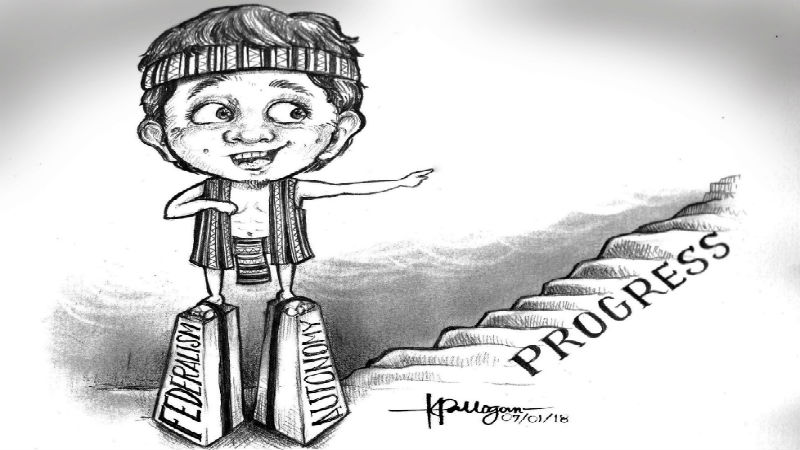President Rodrigo Duterte created a 25-member Consultative Committee (ConCom) to review the 1987 Constitution and recommend to provisions needing amendment to conform with his proposal to shift from the present unitary system to a federal form of government. Last year, the President appointed the initial 19 members of the Concom that convened last February 19, 2018 to start the review of the Charter after which he appointed an additional 3 members to further increase the composition of the body. Two of the members of the ConCom, particularly Dr. Virgilio Bautista and veteran Kalinga politician Lawrence Wacnang, are Cordillerans. Their appointments are in line with his commitment during his meeting with Cordillera leaders in the Palace on July 18, 2018 to include Cordillerans in the ConCom. For over 4 months, the ConCom members meet at least five times a week to review the provisions of the 1987 Constitution and formulate a draft Charter to be submitted to the Chief Executive within the month or before he delivers his third State of the Nation Address (SONA) before members of both chambers of Congress by the 4th Monday of July.
Currently, ConCom members are distributed in different parts of the country to consult the regions on the draft Charter and feel the pulse of the people regarding the planned shift to federal form of government through the amendment of the 1987 Constitution. Based on the initial draft presented to multi-sectoral groups in the region, the proposal is to divide the country into 18 federated regions similar to the way the country was divided into the current administrative regions. Anti-political dynasty provisions, socio-economic policies, among others are mentioned aside from the reorganization of the bureaucracy to ensure that the federal government and its federated states will be strong and able to survive. Further, there will be a Transition Commission to be put in place after the ratification of the draft Constitution to ensure the smooth shift to federalism and guarantee the self-sufficiency of the federated regions. In the national set up, block voting will be implemented wherein the vote for the president will be automatically the vote for the vice president and that the same is true to the federated regions wherein the vote for the regional governor will be the vote for the regional vice governor.
More importantly, Section15, Article 10 of the 1987 Constitution that mandates the establishment of autonomous regions in the Cordillera and Muslim Mindanao was carried in the draft Charter which concretizes the sustained clamor of the Cordillerans for self-determination and self-governance amidst the twice rejection of the previous autonomy laws primarily because of inadequate information, lack of material time for widespread information and education campaign and the watered down version of the laws. Moreover, the inclusion of the autonomy provision in the draft Charter illustrates the recognition of the government of the region’s renewed quest for autonomy amidst efforts by some self-styled Duterte supporters to distort the gains of the region’s clamor for autonomy.
We believe autonomy and federalism are identical as both concepts translate to the decentralization of powers and resources to the local governments to strike a balance in the development of remote communities around the country. Cordillerans must not be confused on autonomy and federalism since both have similar objectives, e.i., the empowerment of the local governments to be resilient in charting their development strategies suitable to the prevailing situation in their areas of jurisdiction. There is also no problem if the Cordillera achieves autonomous status prior to the putting in place of the federal government because the region’s autonomy law will simply be used as an appendix of the federal constitution that will be enacted for the purpose. On the other hand, if federalism comes before the region will achieve autonomy, then the federated region will be constitutionalized upon the ratification by the people of the federal charter thereby establishing an independent federated region for that matter.
We certainly conclude that with the two structures of government being advanced, Cordillerans will be in a better position to attain self-governance and give justice to those who have struggled for the creation of the Cordillera Administrative Region (CAR) after the local governments currently comprising the CAR were disenfranchised by the Division Law during the martial law years. In fact, ConCom members from the Cordillera are vouching for better chances of development once the autonomous or federated region of the Cordillera is in place. It is best for Cordillerans to grab the chances of achieving autonomous status when the law that will be enacted by Congress will not be watered down because we stand to lose nothing at all but we stand to gain the fruits of faster growth and development once the powers and resources will be decentralized to those who know the real situation in the region.
We commend Dr. Bautista and Atty. Wacnang for a job well done in making sure that our primary aspiration for autonomy will not be left out and we also commend the ConCom for recognizing the value of the aspirations of the Cordillerans for self-rule.













